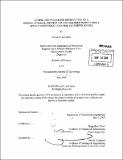Tuning and parameter optimization of a digital integral controller for uniform droplet spray applications using lead-free tin-copper solder
Author(s)
De Castro, Eloisa M
DownloadFull printable version (2.894Mb)
Other Contributors
Massachusetts Institute of Technology. Dept. of Mechanical Engineering.
Advisor
Jung-Hoon Chun.
Terms of use
Metadata
Show full item recordAbstract
The advent of legislation restricting the use of lead in electronics requires innovation and refinement in processes for creating lead-free solder spheres for wafer bumping and other surface mount technology. Operation improvements were made upon a uniform droplet spray apparatus, and its digital integral controller was tuned for application to lead-free solder. Parameters determined included a range of initial controller command frequencies that would produce a stable image given a desired droplet diameter, and the value of the controller gain. The frequency range was determined by measuring the diameters of droplets attained at certain frequencies. The controller gain was optimized by measuring the time it took for the controller to reach its steady state at different gain values. It was determined that initial command frequency should be within ±150 Hz of that corresponding to the target diameter and an integral gain of 0.1 dB is the optimal gain for the tin-copper lead-free solder alloy, performing at par with the system specifications when in use with lead-bearing solder.
Description
Thesis (S.B.)--Massachusetts Institute of Technology, Dept. of Mechanical Engineering, 2009. Cataloged from PDF version of thesis. Includes bibliographical references (p. 21).
Date issued
2009Department
Massachusetts Institute of Technology. Department of Mechanical EngineeringPublisher
Massachusetts Institute of Technology
Keywords
Mechanical Engineering.